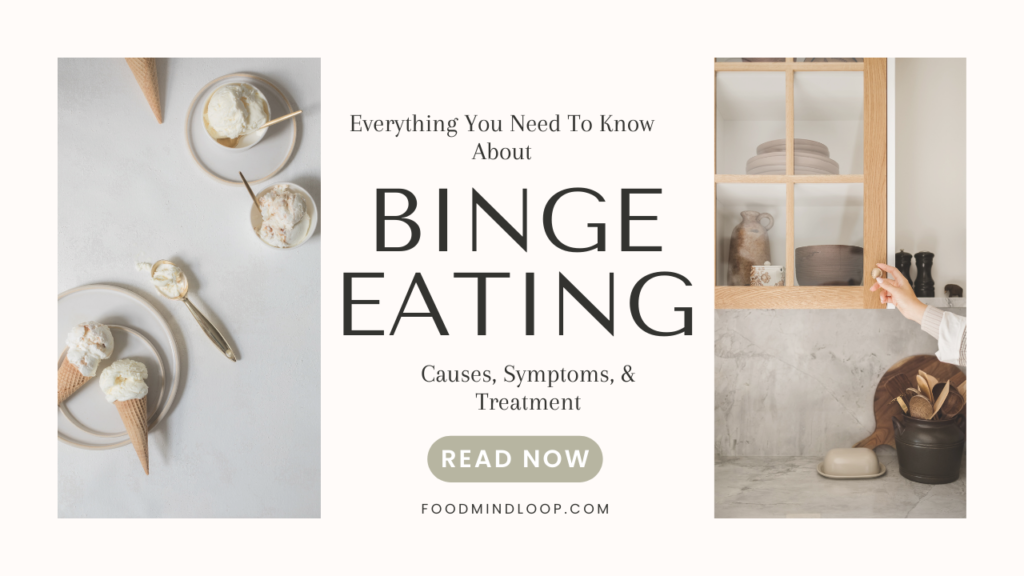Binge eating can be a tough topic to talk about, but understanding it is the first step toward improving your relationship with food and your body. In this post, you’ll learn:
- what binge eating is,
- what causes it,
- the symptoms to look out for,
- and the best ways to treat it.
What is Binge Eating Disorder?

Binge eating disorder (BED) is diagnosed when you frequently consume amounts of food significantly larger than what most people would eat in a similar time frame.
During the episode, you experience a feeling of lack of control, which means you’re unable to stop eating or control the amount of food you consume.
Unlike other eating disorders, there’s no purging afterward, which means no vomiting or excessive exercise to compensate for the food intake.
How BED Differs from Other Eating Disorders
While BED shares some traits with bulimia nervosa and anorexia nervosa, it’s different.
Bulimia involves bingeing and then purging, while anorexia is marked by severe food restriction.
With BED, the binge episodes happen without the purging, leading to feelings of shame and guilt as well as bloating and uncomfortable levels of fullness.
Common Causes of Binge Eating
Binge Eating is a complex issue that is usually caused by several factors:
- Undereating/Lack of essential nutrients: If you are not eating enough during the day, you skip meals or restrict certain macronutrients (like carbs), you’re much more likely to feel out of control around food.
- Diet mindset: Believing that you need to be at a certain weight to be seen as a valuable person and following food rules to achieve that “perfect” weight, is actually one of the main triggers for out-of-control eating. The more you try to stop yourself from eating “unhealthy” food, the more you’ll crave those foods.
- Emotional coping: Food can provide us comfort and a feeling of safety. When we’re feeling overwhelmed, stressed, bored, or anxious it’s a powerful and effective way to deal with those emotions (in the short term).
- Underlying issues: Sometimes Binge Eating can also be caused by underlying triggers like trauma, low self-esteem, or a negative body image. Personality traits like perfectionism, people pleaser, or highly empathic people are also more likely to binge eat.

Common Symptoms of Binge Eating

Recognizing the signs of binge eating disorder is crucial for getting help. These symptoms can be physical, emotional, or behavioral.
Physical symptoms:
- Stomach discomfort, pain, or cramping
- Nausea or feeling ill
- Difficulty concentrating
- Bloating
- Low energy
- Heartburn or other signs of acid reflux
- Diarrhea
- Constipation or feeling blocked
- Weight gain
Negative emotions like anxiety, anger, sadness, boredom or stress can trigger binge eating. Binge eating episodes then fuel more negative feelings. The emotional symptoms of BED include:
- feeling out of control during the binge eating episode
- feeling embarrassed or scared to eat in front of other people
- feeling disgusted or hopeless after the binge eating episode
And the behavioral symptoms are usually several of the following:
- often eating much larger amounts than usual in a short period of time
- eating very fast during binges
- eating when you’re already full or at least not hungry
- eating until you’re uncomfortably full or even physically sick
- eating alone or in secret
- trying to eat less or diet during the rest of the day to compensate (please note: the use of laxatives or excessive exercise is not typical for the Binge Eating Disorder)
Effective Treatment Options for Binge Eating
Effective binge eating disorder treatment must address the underlying causes relevant to each case.
If you have tried to stop yourself from bingeing in the past by following a diet or certain food rules, now you know why that won’t work: it doesn’t address whatever is causing your binge eating, so inevitably you’ll lose control again in the future.
Addressing physical, as well as emotional and psychological aspects is key.
Effective binge eating disorder treatment should always include:
- A detailed analysis of what is triggering your out-of-control eating.
- A treatment plan based on effective therapy techniques like CBT and Mindfulness, as well as the 10 principles of Intuitive Eating.
- Individualized coaching/therapy sessions that focus on your individual challenges.
- Frequent progress checks that allow the opportunity to readjust the treatment speed or content of necessary.
- Help with creating the right environment to overcome your struggles: building a support network, reducing stress etc.

Top 5 FAQs About the Binge Eating Disorder

Binge eating involves consuming large amounts of food with a feeling of loss of control and distress. Overeating might be eating too much occasionally without the psychological distress.
It’s possible to recover completely from the Binge Eating Disorder. The sooner you look for professional support, the faster you’ll start feeling better. If you have chosen a quality coaching or therapy program you can expect lasting results, meaning you’ll never have to go back to the bingeing-restricting-cycle.
Offer empathy and understanding, encourage them to seek professional help, and avoid making judgmental comments about their eating habits or weight. Being a supportive listener can make a big difference.
Seek a consultation with a therapist specializing in eating disorders or a certified intuitive eating counselor and start treating your body with kindness, even if you’re not happy with the way it looks. You can also start tracking your emotions or triggers that seem to set off your binge eating episodes. These steps can help you gain clarity and begin your journey toward recovery.
Instead of specific diets, focus on balanced, regular meals and avoid restrictive dieting. Professional guidance from a therapist or intuitive eating counselor can be beneficial in developing more regular and healthy eating patterns.
Summary
Understanding the binge eating disorder is crucial if you’re struggling with your relationship with food.
By recognizing the causes, symptoms, and treatment options, you can take meaningful steps toward recovery. If you or someone you know is dealing with BED, seek professional help. Remember, support is available, and recovery is possible with the right resources and commitment.
If you found this article helpful, please share it with others who might benefit. Together, we can raise awareness and support those affected by binge eating disorder.

